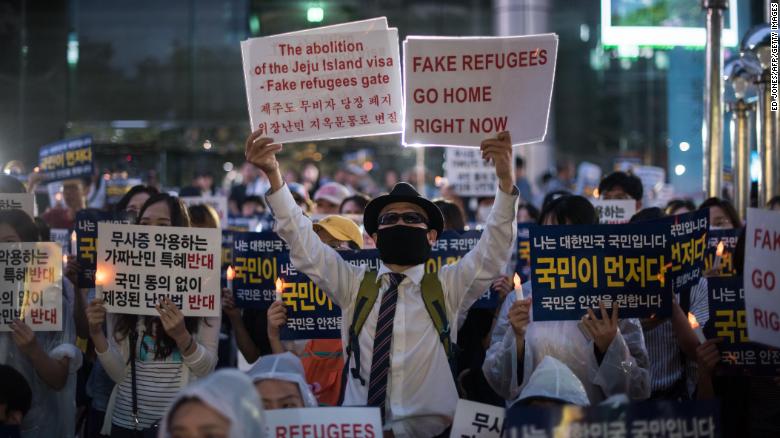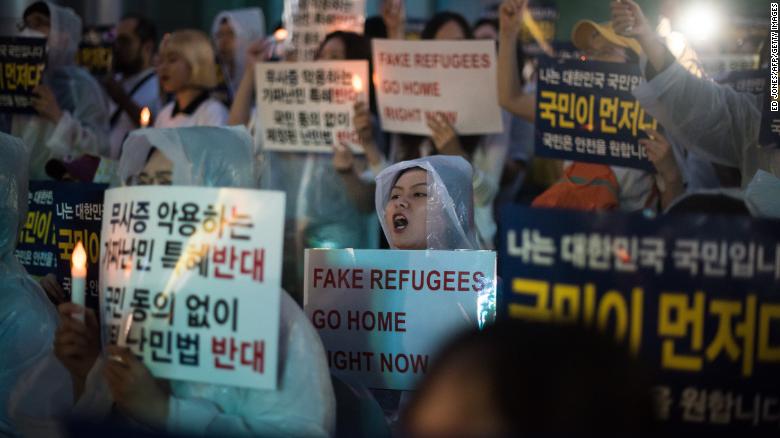Desperately Seeking Haven
"In Yemen, bomb, bomb, bomb every time. No water, no electricity, no job, no school, nothing. How can I give a good life for my son?
"Word spread about Jeju, and I heard I may have a chance."
Muaadh Galal Mohammed al-Razeqee, Jeju, South Korea
"They can take many wives and produce many children."
"Now, there are five hundred of them. In ten and twenty years, how many of them will there be?"
Yang Eun-ok, 70, leadr, Jeju protest
"There was no safe place in Yemen for me to hide."
"I heard South Korea was open for Yemenis."
Hani al-Junaid, 37, journalist, Jeju, South Korea
 |
| Anti-immigration activists attend a protest against a group of asylum-seekers from Yemen, in Seoul on June 30, 2018. |
AirAsia in December began flying direct budget flights from Kuala Lumpur, Malaysia to Jeju in South Korea. Yemenites fleeing the deadly sectarian-fuelled civil war that has become a proxy war between the Shiite Islamic Republic of Iran and the Sunni Kingdom of Saudi Arabia, who were allowed temporary visas to travel to Malaysia -- yet another Muslim-majority country -- saw those direct flights representing a way into mainland South Korea for asylum seekers on the subtropical island.
In the last several months the island that has a reputation as a honeymoon resort island has been visited by asylum seekers for whom their homeland has become an utter catastrophe; death by Houthi Shiites, or Saudi bombs, desperation of malnutrition and disease, nothing left for them in their homeland -- a place of conflict that the United Nations titles "the world's largest humanitarian crisis".
Jeju, off South Korea's southern coast, is where Yemeni refugees wait for the South Korean government to respond to their refugee applications. Their presence on the island, however, has led to an organized anti-asylum movement of "Let's kick out fake refugees!" A summer anti-refugee protest rally on Jeju reflected one held in Seoul. President Moon Jae-in received an online petition with 714,000 signatures, demanding a stop to taking in asylum seekers.
In the tumult of the violence of the civil war in Yemen, thousands of its citizens fled to Malaysia. One Muslim nation surrendering its population to another, for haven from destruction and death. But Malaysia will only permit the refugees a maximum relief of 90 days, refusing to even consider granting them refugee status. So they flee to Jeju and in so doing the former domestic vacation spot is no longer popular with South Koreans.
South Korea in 2002 granted permission to the island to introduce a no-visa policy for most foreign visitors; the perfect solution to fleeing Yemenis' search for haven, the refugees imagined. More recently, however, South Korea placed Yemen on its list of 11 other countries requiring visas to enter Jeju. The South Korean government barred 487 Yemeni asylum seekers still on Jeju from leaving for the mainland.
They must await the results of their applications for refugee status review while on Jeju. There are a relatively paltry several hundred Yemenis on the island, a minuscule percentage of the Island population of 660,000, yet their presence generates concern, sliding into fear. "If these people are safe, why doesn't the government let them move on to the mainland as they wanted to?" questioned Kim Jin-yi 32, an attendee of the Jeju protest.
Like Japan, South Korea prides itself on its homogeneous society, has been traditionally averse to receiving asylum seekers. Its location has helped in not presenting it as a major destination for refugees other than from its neighbour, North Korea and for whom the South has no qualms about accepting as compatriots.
In 2013, under pressure from rights groups, South Korea adopted a new law providing protection for refugees, seeing since then the number of asylum applications rise from 2,896 in 2014 to 9,942 last year. There are warnings internally circulating on the Internet of an invasion of Arab terrorists or rapists. The dysfunctional world of Islam creates the world's greatest number of refugees desperately fleeing oppression, violence and death.
Those Islamic countries not in conflict refuse to give haven to their co-religionists.
 |
| Anti-immigration activists attend a protest against a group of Yemen asylum seekers, Seoul, June 30, 2018. |
Labels: Civil War, Haven, Refugees, Rejection, South Korea, Suspicion, Yemen

<< Home